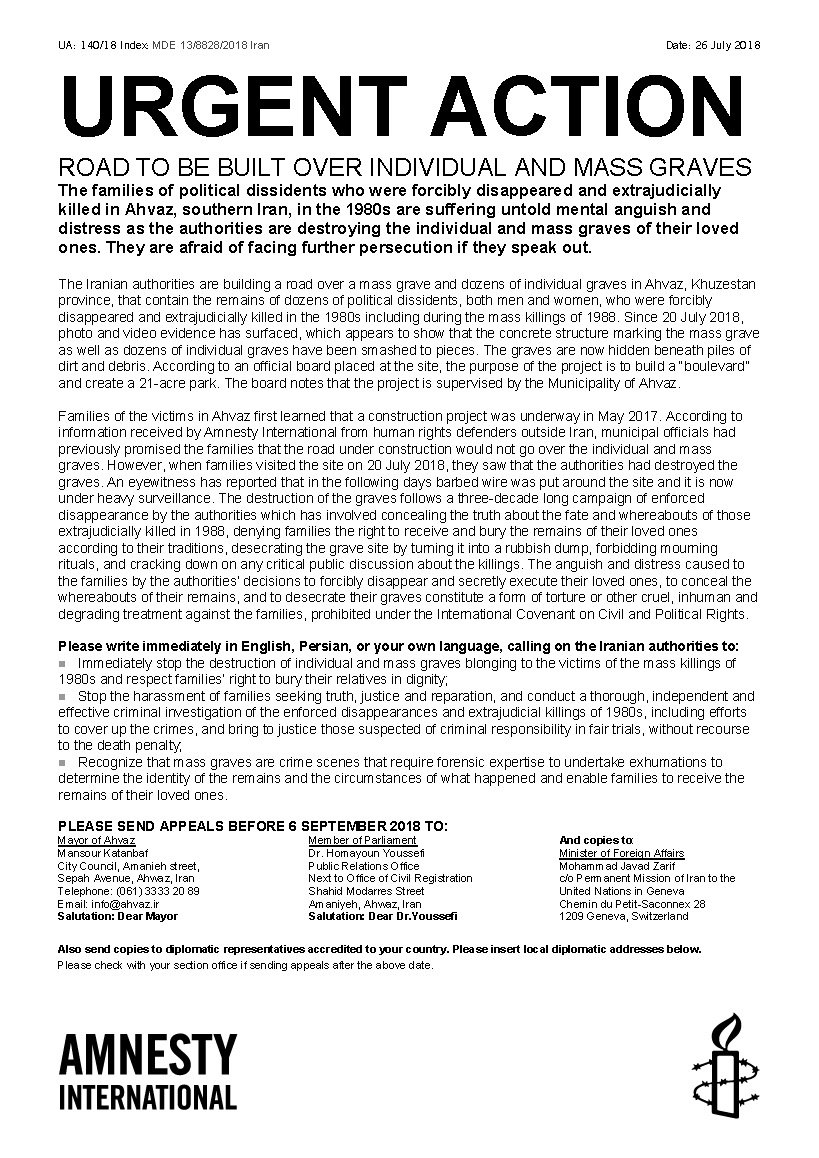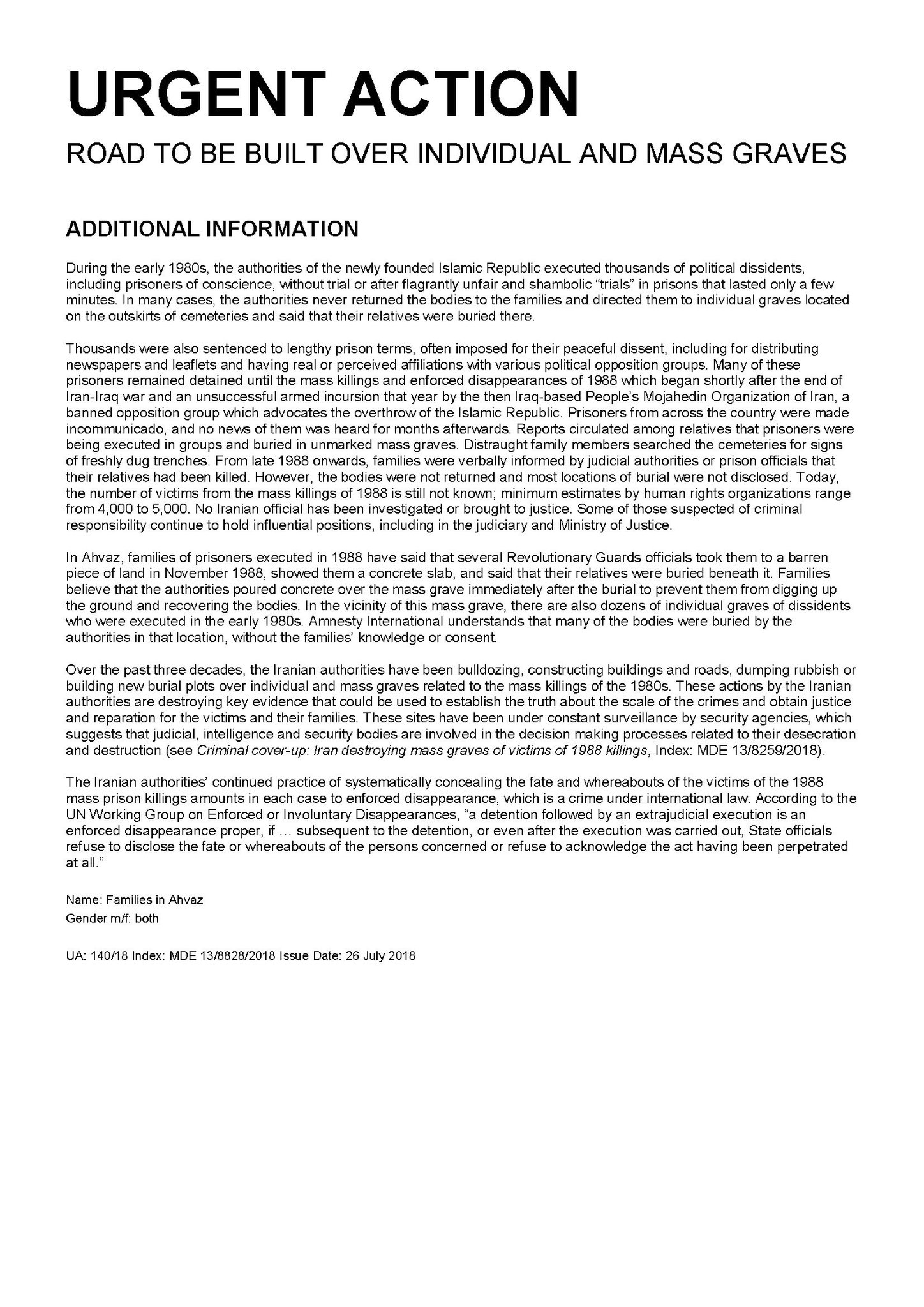Iran: Road to be built over individual and mass graves
The families of political dissidents who were forcibly disappeared and extrajudicially killed in Ahvaz, southern Iran, in the 1980s are suffering untold mental anguish and distress as the authorities are destroying the individual and mass graves of their loved ones. They are afraid of facing further persecution if they speak out.
***
Amnesty International reports that Iran’s regime is destroying a mass grave of the victims of the 1988 massacre. According to estimates from the opposition, these victims number in the 10s of 1000s (the vast majority from the MEK).
Meanwhile:
The Trump administration must now prepare for near-term Iranian terrorist attacks against the U.S. homeland, because the leader of Iran’s revolutionary guards, or IRGC, external action force gave a very aggressive speech on Thursday.
Addressing followers in the ancient city of Hamedan (a location probably chosen as a metaphor of Iranian durability), Qassem Soleimani warned Americans, “We are closer to you than what you think. You should know that I am your foe. The Quds Force alone and not all the Armed Forces is enough to be your rival. You are aware of Iran’s power in asymmetric war.”
Soleimani means for his words to be taken as references to terrorist attacks. In specific terms, IRGC modus operandi and tactical capability render “closer to you than what you think” and “asymmetric war” as references to Quds force attack cells and cyber-strike teams in the U.S. homeland, South America, and Europe.
But Soleimani wasn’t done there.
Again emphasizing “We are so close to you in places that you might not even think of,” Soleimani declared “You should know that there is not even a single night that we don’t think of destroying you.” Soleimani also drew a sharp reference to his role subjecting U.S. forces in Iraq to explosively formed penetrator attacks, stating “”have you forgotten when you had provided adult-size diapers for your battle tank crews?” EFP attacks killed hundreds of Americans and wounded many more.
Soleimani loved the EFPs for their brutality. In David Finkel’s The Good Soldiers, we hear about U.S. Army Specialist Joshua Reeves, whose vehicle was hit by an EFP in Baghdad. Reeves “wasn’t breathing, his eyes weren’t moving, his left foot was gone, his backside was ripped open, his stomach was filling with blood …” Reeves died the same day that his wife had told him that she had given birth.
And in a reference to Iranian martyrdom ideology, deeply vested in the revolution’s theological appropriation of the Battle of Karbala, Soleimani concluded, “We are thirsty for martyrdom and annihilation of arrogant powers.”
He wants the U.S. to know the IRGC will proudly die for their cause.
The U.S. may now have to help them on that course, because the U.S. must respond deliberately to this speech.
First off, President Trump should recognize that the Iranians aren’t playing around here. Soleimani has the pedigree to render very bloody terrorist attacks into action. He also has no qualms about massacring U.S. civilians (the Quds force nearly blew up a Washington, D.C., restaurant in 2011) and recently tried to blow up a Paris conference attended by U.S. officials. Indeed, Soleimani’s words exemplify why we argued this week that Trump must be more focused in his red-line warnings to Iran.
But what specifically should be done?
Both Trump and Secretary of State Mike Pompeo should take the lead in warning that any terrorist attacks on the U.S. will result in two immediate effects.
First, aggressive U.S. military strikes on IRGC infrastructure belonging to the Quds force and the IRGC at large. Pompeo’s role is important here because the former CIA director took a tough line against the IRGC, and Soleimani knows he means business.
Second, the U.S. should make clear that Soleimani and his senior leadership figures will be personally targeted. While some, like former Obama administration official Tommy Vietor, believe such threats would be outrageous, it is important that the Iranian hardliners know any terrorist attacks will not meet a standard fare response. They must know that the U.S. will metaphorically gut them if they come for our citizens. If Soleimani and his cadre do not understand that U.S. deterrent posture, they will kill innocent Americans. Evidencing their willingness to up the ante, the Quds Force directed Houthi rebel forces in Yemen to target cargo vessels passing through the Red Sea on Wednesday.
But the Trump administration should also be clear about where this is heading. As it attempts to destabilize the Iranian regime with economic pressure, the Iranian regime is showing that it will not go down without a fight.
Ultimately, Qassem Soleimani’s threats should be taken very seriously. He is a skilled commander with significant terrorist capabilities and an ideologically vested hatred for America. He must be dealt with as such.







